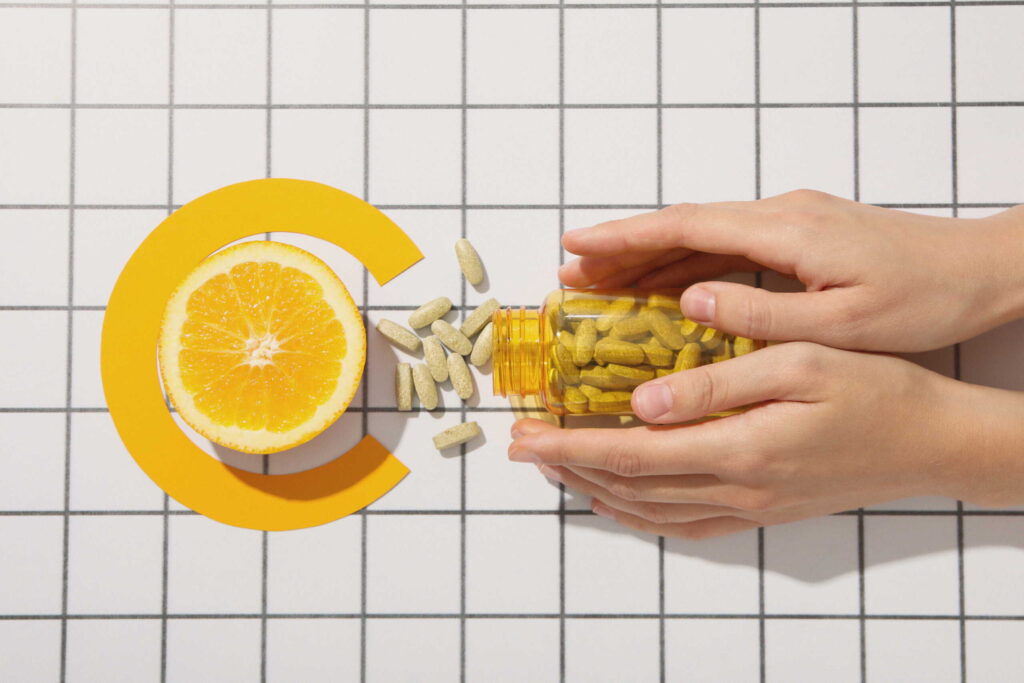Ascorbic acid, commonly known as vitamin C, is an essential nutrient that plays a vital role in maintaining good health.
Although it’s widely known to be beneficial, it’s crucial to be cautious while supplementing vitamin C and avoid consuming excessively high doses unless prescribed for a specific medical condition.
This article explores the potential health hazards linked to overdosing on vitamin C, underscoring the importance of adhering to the recommended daily intake.

Daily Recommended Intake of Vitamin C
Comprehending the fundamental requirements to achieve optimal health without any harmful outcomes is crucial.
For males, the suggested daily intake of vitamin C is 90 mg, whereas for females, it is 75 mg.
These values are necessary benchmarks to fulfill the body’s indispensable requirements, establishing a basis for a well-balanced diet.
Common Side Effects of Excessive Vitamin C
It’s important to know that taking too much vitamin C can lead to side effects.
These can include diarrhea, nausea, cramps, and other digestive issues.
These symptoms happen when unabsorbed vitamin C stays in the digestive tract.
You can avoid these issues by watching how much vitamin C you take.
Cardiovascular Risks and High Vitamin C Intake
Possible links between a high intake of supplemental vitamin C (at least 300 mg/day) and an elevated risk of mortality due to cardiovascular disease have been examined in studies, especially in postmenopausal women with diabetes.
Nevertheless, this discovery is not definitive, as other epidemiological studies have yet to find similar relationships.
More research is necessary to clarify these potential hazards.

Kidney Stones and Iron Overload Concerns
High vitamin C intake can lead to increased excretion of urinary oxalate and uric acid, which may increase the risk of kidney stone formation, particularly in people with renal disorders.
Furthermore, although excessive absorption of iron caused by vitamin C does not harm healthy individuals, those with hereditary hemochromatosis may develop iron overload and tissue damage due to long-term high-dose vitamin C consumption.
Therefore, individuals with specific health conditions should carefully consider the risks of high vitamin C intake.
Pro-Oxidant Effects and Other Health Risks
There are certain circumstances under which vitamin C may act as a pro-oxidant, raising concerns about its potential contribution to cancer development through oxidative damage.
The evidence is contradictory, with some in vitro studies suggesting a connection.
In contrast, others have not found any increase in oxidative damage or cancer risk associated with high vitamin C intake.
Further research must be conducted to establish a more explicit link.
Some of the other effects of high vitamin C intake that have been reported include reduced levels of vitamin B12 and copper, faster metabolism or excretion of ascorbic acid, erosion of dental enamel, and allergic reactions.
However, many of these findings may be due to assay artifacts and must be verified through extensive studies.
Natural Sources of Vitamin C
Including various fruits and vegetables in your diet is essential to get enough vitamin C naturally without relying solely on supplements.
Citrus fruits like oranges, grapefruits, and lemons have high levels of vitamin C.
Berries, kiwis, mangoes, and pineapples are also good sources of vitamin C.
Vegetables such as bell peppers, broccoli, Brussels sprouts, and tomatoes are also excellent sources of vitamin C.
By including these foods in your meals, you’ll not only get the vitamin C you need but also benefit from the other essential nutrients found in whole foods.
In conclusion, it’s important to avoid taking too many vitamin C supplements unless prescribed for a specific medical condition.
Consuming too much vitamin C can lead to health risks like stomach discomfort, potential heart problems, kidney stone formation, and other possible adverse effects.
The recommended maximum daily vitamin C intake is 2000 mg; exceeding this limit over a long time can increase the risk of adverse side effects.
If you are considering taking vitamin C supplements for medical reasons, it’s best to consult a physician for proper guidance and monitoring.
It’s crucial to balance vitamin C’s benefits and be mindful of how much you consume to ensure optimal health.
You can also try natural sources of vitamin C to meet your daily intake.
References
Disclaimer
- Het is alleen bedoeld voor algemene informatieve doeleinden: De informatie op de website en app van BioKissed, inclusief maar niet beperkt tot zakelijke mogelijkheden, voedingstips, tips voor een gezonde levensstijl, praktijkartikelen voor een gezonde levensstijl, voedende recepten en wellnessartikelen (hierna gezamenlijk aangeduid als “Content”), is uitsluitend bedoeld voor algemene informatieve doeleinden. De Inhoud is niet bedoeld als vervanging van professioneel zakelijk advies, medisch advies, diagnose of behandeling.
- Het is uitsluitend op eigen risico: BioKissed beveelt geen specifieke tests, artsen, producten, procedures, meningen of andere informatie aan die mogelijk op de website of app worden vermeld. Vertrouwen op enige informatie verstrekt door BioKissed, haar werknemers, gecontracteerde schrijvers, of anderen die op uitnodiging van BioKissed op de website of app verschijnen is uitsluitend op eigen risico.
- BioKissed onderschrijft of keurt geen standpunten in de Content goed: BioKissed staat niet in voor de juistheid, volledigheid of bruikbaarheid van de Content, noch onderschrijft zij de standpunten die in de Content worden geuit. De opname van Content op BioKissed’s website of app impliceert geen goedkeuring van dergelijke Content.
- U neemt vrijwillig al deze risico’s op u: Voordat u deelneemt aan een uitdaging, uw levensstijl aanzienlijk aanpast, uw eetgewoonten wijzigt of deelneemt aan aanverwante activiteiten, is het raadzaam om uw persoonlijke gezondheid en conditie te beoordelen. BioKissed wijst uitdrukkelijk verantwoordelijkheid af voor de stoffen die individuen kiezen te consumeren, en het bedrijf is niet aansprakelijk voor eventuele gevolgen, met inbegrip van die met betrekking tot voedselallergieën, als gevolg van dergelijke keuzes. Door te kiezen voor deelname aan een uitdaging, erkent u en gaat u ermee akkoord dat dergelijke activiteiten inherente risico’s met zich meebrengen, en u neemt vrijwillig al deze risico’s op u, zelfs als deze voortvloeien uit de nalatigheid van BioKissed, aan haar gelieerde bedrijven of haar leden.
- BioKissed en haar contentaanbieders wijzen elke verantwoordelijkheid of aansprakelijkheid voor gevolgen af: BioKissed en haar contentaanbieders aanvaarden geen verantwoordelijkheid of aansprakelijkheid voor enig gevolg dat direct of indirect verband houdt met enig handelen of nalaten dat u doet op basis van de informatie die u vindt op of via de website of app van BioKissed.
- Meer lezen
